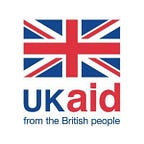Tackling Disability Discrimination in Uganda
#ZeroDiscrimination
Globally there are an estimated one billion people with disabilities, 80% of whom live in developing countries. Disability inclusion is currently one of the most neglected and under-prioritised areas of international development. We are committed to changing this.
We are proud of the great work our partners, such as Motivation, are doing to tackle discrimination and promote the rights of people with disabilities. In Uganda we are funding Motivation’s mother and child support group and their work to change the lives of Sunday and his Mother Agnes.
Meet three-year-old Sunday and his mother Agnes. Today Sunday can feed himself, play outside and kick a football. Agnes hopes that one day her son will go to school.
Life for Agnes and Sunday used to be very different. Sunday has cerebral palsy and when he was born Agnes was put under huge pressure to abandon him. Much of Agnes’ community thought he was cursed and believed his cerebral palsy was the result of witchcraft. Feeling desperate and alone, Agnes hid Sunday away inside his house for the first two years of his life.
People were calling my child ‘ghost’ so I used to hide him. I thought I was the only one with a disabled child. — Agnes
Unfortunately, Sunday and Agnes’ experiences are not unique. People with disabilities are among the most marginalised, neglected and vulnerable groups in the developing world. In countries like Uganda a disabled child is seen as a curse, bringing shame on the family. Mothers are often told to abandon or even kill children with disabilities.
Children with cerebral palsy are frequently left lying on the floor. They can live lonely and isolated lives. They are at greater risk from malnutrition, respiratory problems or pressure sores. In the very worst cases, they die.
Agnes’ own mother-in-law chased her and Sunday out of the family home. She still refuses to have any contact with them. This marked a turning point for Agnes. She then joined Motivation’s mother and child support group.
Through the group she has made friends with other women, many who have the same experiences. She has also learned how to take care of Sunday and how to keep him well.
Children with cerebral palsy often struggle to eat. Simple techniques like supporting their jaw whilst they try to chew and swallow can make a huge difference. Agnes also learned how to position Sunday correctly, to avoid life-threatening pressure sores.
Now I believe in my child. He can play — he can even kick a ball. I am also realising that he is actually very clever. I am going to register to send him to send him to school.
A better future
Many of the villagers have changed their attitude towards Sunday, because of the improvements he has made. He has made friends, enjoys telling stories and loves to play outside. Agnes is growing in confidence thanks to the support from Motivation. She’s begun planning a future for her son and is saving to fund a joint agricultural project and open a store to sell the produce.
Agnes also wants to share what she’s learnt.
I want to be able to help. I never went to school so I feel proud that because of the training I have had, I can support others.
